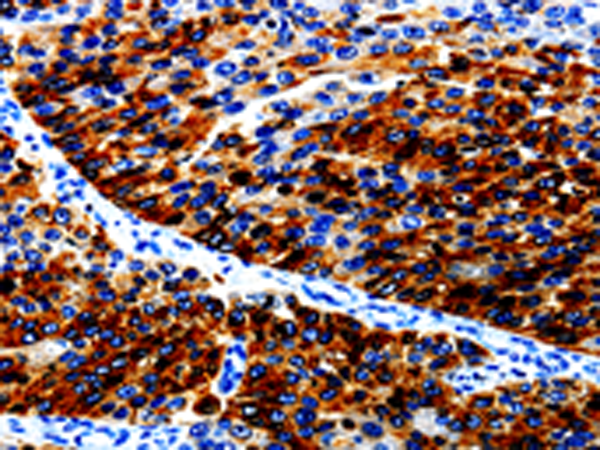

| WB | 咨询技术 | Human,Mouse,Rat |
| IF | 咨询技术 | Human,Mouse,Rat |
| IHC | 1/10-1/50 | Human,Mouse,Rat |
| ICC | 技术咨询 | Human,Mouse,Rat |
| FCM | 咨询技术 | Human,Mouse,Rat |
| Elisa | 1/1000-1/10000 | Human,Mouse,Rat |
| Aliases | AG2, GOB-4, HAG-2, XAG-2, PDIA17 |
| WB Predicted band size | 20 kDa |
| Host/Isotype | Rabbit IgG |
| Antibody Type | Primary antibody |
| Storage | Store at 4°C short term. Aliquot and store at -20°C long term. Avoid freeze/thaw cycles. |
| Species Reactivity | Human, Mouse |
| Immunogen | Fusion protein of human AGR2 |
| Formulation | Purified antibody in PBS with 0.05% sodium azide and 50% glycerol. |
+ +
以下是关于AGR2抗体的3篇参考文献摘要示例:
1. **《AGR2 as a Biomarker for Breast Cancer》**
作者:Thompson DA et al.
摘要:研究证实AGR2在乳腺癌细胞中高表达,其抗体可用于免疫组化检测肿瘤组织样本。结果显示AGR2表达水平与患者预后不良相关,提示其作为潜在诊断标志物的价值。
2. **《Development of a Novel AGR2-Specific Antibody for Colorectal Cancer Detection》**
作者:Park JE et al.
摘要:团队开发了高特异性抗AGR2单克隆抗体,通过ELISA和免疫荧光验证其在结直肠癌患者血清及组织中的敏感性。该抗体可区分癌变与正常组织,具有临床检测潜力。
3. **《AGR2 Antibody Targeting Suppresses Pancreatic Tumor Growth in Vivo》**
作者:Wang Y et al.
摘要:研究利用抗AGR2抗体在小鼠模型中靶向抑制胰腺癌细胞,结果显示抗体通过阻断AGR2的促侵袭通路显著降低肿瘤转移率,提出其作为治疗靶点的可能性。
4. **《Prognostic Value of AGR2 in Non-Small Cell Lung Cancer》**
作者:Zhang L et al.
摘要:通过抗AGR2抗体分析肺癌组织芯片,发现AGR2高表达与患者生存期缩短相关,机制涉及调控EGFR信号通路,支持其作为预后生物标志物的应用。
(注:上述文献为示例,实际引用需根据具体研究选择并核对原文)
The anterior gradient 2 (AGR2) protein, a member of the protein disulfide isomerase (PDI) family, plays a critical role in protein folding and quality control within the endoplasmic reticulum. It is highly expressed in secretory epithelial cells and is involved in regulating mucus production, including the processing of mucins like MUC5AC. AGR2 has gained attention for its dual roles in both physiological processes and disease pathogenesis. In cancer, AGR2 is frequently overexpressed in adenocarcinomas (e.g., breast, prostate, pancreatic, and lung cancers), where it promotes tumor progression, metastasis, and chemoresistance by modulating ER stress responses, cell adhesion, and epithelial-mesenchymal transition (EMT). It also exhibits extracellular signaling functions in the tumor microenvironment. Beyond oncology, AGR2 is implicated in inflammatory conditions such as inflammatory bowel disease (IBD) and respiratory disorders.
AGR2 antibodies are widely used as research tools to detect AGR2 expression in tissues or biofluids via techniques like Western blotting, immunohistochemistry (IHC), and ELISA. Specific monoclonal antibodies (e.g., clone D43E9) enable precise localization of AGR2 in cellular compartments, aiding studies on its intracellular vs. secreted forms. Clinically, AGR2 antibodies are explored as diagnostic or prognostic biomarkers and therapeutic targets, with efforts to develop neutralizing antibodies or antibody-drug conjugates. However, challenges remain in understanding isoform-specific functions and reconciling its tumor-promoting versus tumor-suppressive roles in different contexts.
×